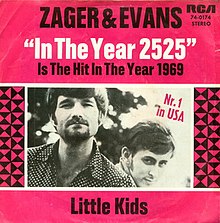Zager and Evans were an American rock-pop duo active during the late 1960s and early 1970s, comprising Denny Zager and Rick Evans. They are best known for their 1969 No. 1 hit single "In the Year 2525", which earned them one-hit wonder status.

"I Can't Get Next to You" is a 1969 No. 1 single recorded by the Temptations and written by Norman Whitfield and Barrett Strong for the Gordy (Motown) label. The song was a No. 1 single on the Billboard Top Pop Singles chart for two weeks in 1969, from October 18 to October 25, replacing "Sugar, Sugar" by the Archies and replaced by "Suspicious Minds" by Elvis Presley. The single was also a No. 1 hit on the Billboard Top R&B Singles for five weeks, from October 4 to November 1, replacing "Oh, What a Night" by the Dells, and replaced by another Motown song, "Baby I'm For Real" by the Originals.
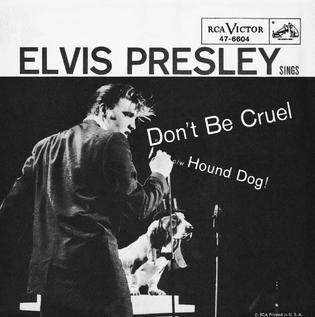
"Don't Be Cruel" is a song that was recorded by Elvis Presley and written by Otis Blackwell in 1956. It was inducted into the Grammy Hall of Fame in 2002. In 2004, it was listed #197 in Rolling Stone's list of 500 Greatest Songs of All Time.

Sugar, Sugar is a song written by Jeff Barry and Andy Kim. It was originally recorded by the Archies, a fictional band of studio musicians linked to the 1968–69 US Saturday morning TV cartoon The Archie Show, inspired by the Archie Comics. In the autumn of 1969 the single topped both Billboard's Hot 100 and the UK Singles Chart, ranking number one for the year in both America and Britain. “Sugar, Sugar” is the most successful bubblegum pop single of all time, and is widely regarded as the apotheosis of the late-1960s/early-1970s bubblegum music genre. In mid-1970 R&B/soul singer Wilson Pickett achieved success on both the US soul and pop charts with a cover version.

"I Write the Songs" is a popular song written by Bruce Johnston in 1975 and released on his album Going Public in 1977. Barry Manilow's version reached number one on the Billboard Hot 100 chart in January 1976 after spending two weeks atop the Billboard adult contemporary chart in December 1975. It won a Grammy Award for Song of the Year and was nominated for Record of the Year in 1977. Billboard ranked it as the No. 13 song of 1976.

"Wonderful World" is a song by American singer-songwriter Sam Cooke. Released on April 14, 1960, by Keen Records, it had been recorded during an impromptu session the previous year in March 1959, at Sam Cooke's last recording session at Keen. He signed with RCA Victor in 1960 and "Wonderful World", then unreleased, was issued as a single in competition. The song was mainly composed by songwriting team Lou Adler and Herb Alpert, but Cooke revised the lyrics to mention the subject of education more.
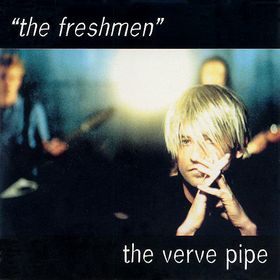
"The Freshmen" is a song by American alternative rock band the Verve Pipe. Released in January 1997 as the third single from their second studio album Villains, the song became the band's breakthrough hit and is the group's highest-charting single, peaking at number five on the US Billboard Hot 100, number six in Canada, and number 28 in Australia.

"You're the One" is a song recorded by American female R&B vocal trio SWV for their second studio album, New Beginning (1996). RCA Records released the song on March 29, 1996, as the lead single from New Beginning. "You're the One" topped the US Billboard Hot R&B Singles chart and became a top-10 hit on the Billboard Hot 100 and in New Zealand, receiving gold certifications in both countries. A sample of this song can be heard in South Korean boy group EXO's song "Ya Ya Ya" from their seventh studio album, Obsession (2019).
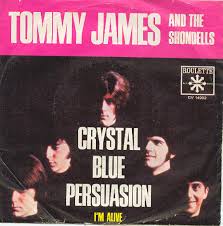
"Crystal Blue Persuasion" is a 1968 song originally recorded by Tommy James and the Shondells and composed by Eddie Gray, Tommy James and Mike Vale.

"Cupid" is a song by American singer Sam Cooke, released on May 16, 1961. It charted at number 17 on the Billboard Hot 100 and number 20 on the Hot R&B Sides chart; the track performed best in the United Kingdom, peaking at number seven on the UK Singles Chart. The song is featured on Cooke's greatest hits album, The Best of Sam Cooke (1962). Cooke's producers had asked him to write a song for a girl they had seen on a Perry Como TV show—but once they heard her sing, they kept "Cupid" for Cooke himself.

"Spinning Wheel" is a song from 1968 by the band Blood, Sweat & Tears, written by Canadian lead vocalist David Clayton-Thomas and appearing on their eponymous album.
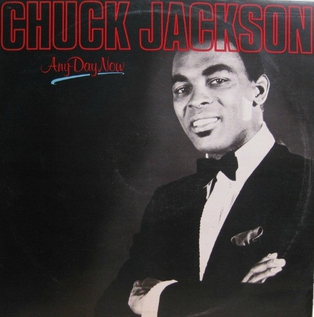
"Any Day Now" is a popular song written by Burt Bacharach and Bob Hilliard in 1962. It has been recorded by numerous artists over the years, including notable versions by Chuck Jackson in 1962, Alan Price in 1965, Elvis Presley in 1969, Scott Walker in 1973 and Ronnie Milsap in 1982. In the lyrics, the singer predicts the imminent demise of a romantic relationship and describes the sadness this will leave.
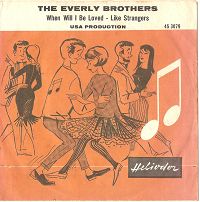
"When Will I Be Loved" is a popular song written by Phil Everly of the Everly Brothers, who had a US top-ten hit with it in 1960. Linda Ronstadt covered the song in 1975, and her version was an even bigger hit in the US, peaking at No. 2. Vince Gill also covered it in 1994 on the soundtrack of the film 8 Seconds.
Billboard Top Pop Hits is a series of compilation albums released by Rhino Records in 1994 and 1995, each featuring ten recordings from the easy listening charts from a specific year in the 1960s. Ten albums in the series were released, one each for the years from 1960 to 1969.

"Let's All Chant" is a song written by American record producer and composer Michael Zager and Alvin Fields, and performed by the Michael Zager Band. It was based on an idea originally suggested by former A&M Records head of A&R Jerry Love after he visited clubs in New York and saw people endlessly chanting "Ooh-ah, Ooh-ah". Although Zager was first embarrassed when Love asked him to write a song using these chants, he accepted the proposal and later co-wrote "Let's All Chant" with Fields.

"Then You Can Tell Me Goodbye" is a song written by John D. Loudermilk. It was first released in 1962 by Don Cherry, as a country song and again as a doo-wop in 1967 by the group The Casinos on its album of the same name, and was a number 6 pop hit that year. The song has since been covered by Eddy Arnold, whose version was a number 1 country hit in 1968, and by Neal McCoy, whose version became a Top 5 country hit in 1996.
"Peter Gunn" is the theme music composed by Henry Mancini for the television show of the same name. The song was the opening track on the original soundtrack album, The Music from Peter Gunn, released by RCA Victor in 1959. Mancini won an Emmy Award and two Grammys for Album of the Year and Best Arrangement. In 2005, the song was inducted into the Grammy Hall of Fame.

The singles discography of American country artist Dottie West contains 59 singles released as a solo artist, 12 singles released as a collaborative artist, 3 promotional singles and 1 other charting song. West signed with RCA Victor Records in 1963, having her first Top 40 hit the same year. It was followed in 1964 by "Love Is No Excuse", a duet with Jim Reeves that became West's first top 10 hit. In 1964, she also released "Here Comes My Baby". The song reached number 10 on the Billboard Hot Country Singles chart and became the first song by a female country artist to win a Grammy award. From her 1966 album, West issued four singles, including the top 10 hits "Would You Hold It Against Me" and "What's Come Over My Baby". Over the next two years she had major hits with "Paper Mansions", "Like a Fool", "Country Girl", and "Reno". In 1969, West collaborated with Don Gibson on "Rings of Gold", which reached number 2 on the Billboard country chart. In 1973, she released a single version of a commercial jingle originally used by The Coca-Cola Company. Entitled "Country Sunshine", the song became West's biggest hit, reaching number 2 on the country songs chart and number 49 on the Billboard Hot 100. The song also nominated her for her eleventh Grammy. After releasing the top 10 hit "Last Time I Saw Him" (1974), West's chart hits declined and she was dropped from RCA in 1976.

2525 is the debut studio album by Zager and Evans and was released in 1969. It reached #30 on the Billboard Top LPs chart. The album featured the single "In the Year 2525 " which reached #1 on the Billboard Hot 100, on the adult contemporary chart, on the UK Singles Chart, and on the Canadian Pop and AC charts.

